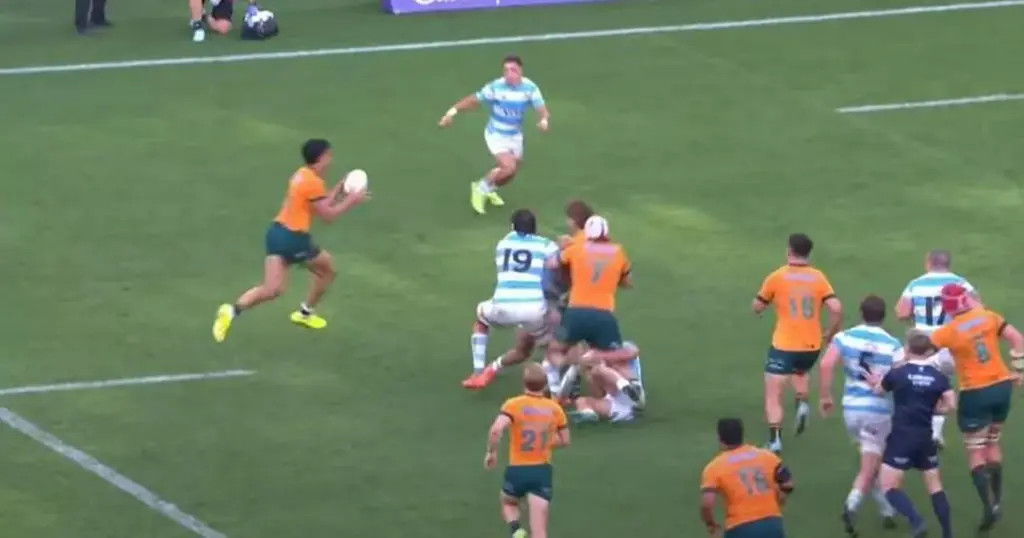
The Rugby Championship clash between Australia and Argentina ended in controversy, as a late decision by officials left fans and commentators outraged. The match, held on Saturday, saw the Wallabies trailing 28-7 before mounting a spirited comeback, only to be thwarted by a contentious call in the dying minutes.
Australia, buoyed by two quick tries from Andrew Kellaway and Filipo Daugunu, were hopeful of a repeat of their dramatic victory from the previous week. However, with just five minutes remaining, a pass from Fraser McReight to Max Jorgensen was ruled forward by the assistant referee, dashing hopes of a last-minute comeback. Moments later, Daugunu crossed for his second try, igniting a storm of controversy.
Controversial Call and Its Aftermath
The crux of the controversy lay in the final pass from Kellaway, which appeared to drift forward as he stretched to collect the ball. Even Australian commentators expressed doubt, with one remarking, “Will this one stand? That was forward out of the hands.” Despite these concerns, referee Christophe Ridley, advised by the Television Match Official (TMO), allowed the try to stand without a formal review.
According to Law 11.6 of rugby, a forward pass results in a scrum. However, officials now consider “relative velocity,” acknowledging that a player’s forward momentum can cause the ball to travel forward even if it leaves the hands backward. This nuance in the rules did little to quell the backlash.
Reactions from Experts and Fans
The decision was met with disbelief from commentators and former players. Stan Sports’ lead commentator Sean Maloney simply exclaimed, “Wow,” while ex-Wallabies flanker Michael Hooper expressed skepticism, saying, “They must have a different angle there. I don’t know what the Spanish is for ‘we were robbed’. Gee, that looked bad! If you are Felipe Contepomi and Argentina, you are absolutely filthy!”
Former Australia captain Tim Horan added, “Kellaway’s pass was forward out of the hands,” suggesting that Australia had “got away with one there.” The sentiment was echoed by Supersport’s Derek Albert, who criticized the TMO’s decision as “inexcusable.”
“Absolute garbage that last AUS try was allowed to stand. Clearly forward. Metres forward. Ridiculous.” — Brett McKay, ABC Sport
Social media platforms were inundated with similar sentiments, with users pointing out the apparent forward nature of the pass. One user noted, “When even the Aussie commentators question the pass you know it wasn’t ‘flat’.” Another added, “The last pass to Daugunu was forward by a country mile. There’s no way that try should have been allowed to stand.”
Historical Context and Implications
This incident is not the first time rugby matches have been mired in controversy due to officiating decisions. The role of the TMO has been under scrutiny in recent years, with debates over its effectiveness and the consistency of its use. The current rules, which attempt to balance the letter of the law with the spirit of the game, often leave room for interpretation, leading to contentious outcomes.
In the broader context of the Rugby Championship, this decision could have significant implications for the Wallabies. The loss to Argentina, despite their valiant comeback, leaves Australia with a challenging path forward in the tournament. The controversy also highlights the ongoing debate about the need for clearer guidelines and more consistent application of technology in officiating.
Looking Ahead
As the Rugby Championship progresses, the focus will likely remain on the officiating standards and the role of technology in decision-making. For the Wallabies, the immediate task is to regroup and address the issues that led to their early deficit against Argentina. Meanwhile, the rugby community will continue to discuss and dissect the controversial decision, with calls for reform and greater transparency in officiating processes.
Ultimately, the match serves as a reminder of the passionate debates that can arise in sports, where the fine margins between victory and defeat are often determined by split-second decisions. As teams and fans look ahead to future fixtures, the hope is for a fair and consistent application of the rules that uphold the integrity of the game.





